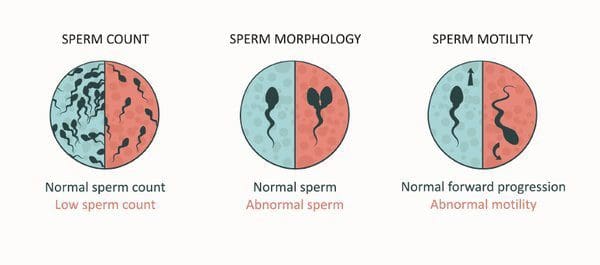When the topic of infertility comes to mind, many people are often quick to associate fertility issues with a female. With 39% of total infertility due to female infertility1, it’s not surprising that such “stereotypes” happen. However, let’s not forget the other equally important part of the fertility equation — male infertility.
Many men find male infertility a taboo topic to broach to friends and family, and probably even their spouse. Around the world, there still exists a strong stigma regarding male infertility — that it is a sign of poor virility. After all, no man wants to be talking about “shooting blanks” regardless of age or culture.
While male infertility and sexual performance issues might be seemingly intertwined, they are two different issues with a different set of causations. Hence it is important to distinguish between the two. How are they different you might ask?
We asked two specialists, Prof Chia Sing Joo, a urologist from Ml’ve Urocare Center, who specialises in the care of the male reproductive system, and Dr Fong Yang, an IVF clinician from Astra Centre for Women & Fertility, who specialises on male and female fertility for the purposes of pregnancy, to explain how the two differ and what they mean when it comes to planning for a pregnancy.
What is male infertility?
Prof Chia Sing Joo: Male infertility refers to a male’s inability to cause pregnancy in a fertile female. Infertility problems are typically suspected when a couple has not conceived after 12 consecutive months of regular unprotected sexual intercourse. While female infertility may be more predominant, 20-30% of the infertility cases are due to male infertility2.
Male infertility is due to poor sperm quality, which can be due to 1) low sperm count, 2) abnormal sperm morphology e.g. shape/structure, and/or 3) sperm motility issues i.e. not being able to swim to the egg.
How does male infertility differ from poor sexual performance?
Prof Chia: As shared earlier, male infertility is associated with the sperms. Hence, men who possess poor sperm quality and quantity usually do not display any visible symptoms and may not encounter sexual performance issues i.e. they can still ejaculate normally during sex.
On the other hand, for men with sexual performance issues, the man is often unable to perform during sexual intercourse, which could also result in the failure to conceive naturally. It is important to keep in mind that sexual performance issues do not equate to poor sperm count or quality. In fact, these men may still be able to produce healthy levels of quality sperms.
 Dr Fong Yang: For the purposes of pregnancy planning, men with sexual performance issues can still achieve pregnancy by retrieving sperm samples using assisted reproductive techniques such as Intrauterine Insemination (IUI), which involves placing the sperms in the woman, or In-Vitro Fertilisation (IVF), which uses these sperms to fertilise a harvested egg from the female, before placing the embryo back into a woman’s womb.
Dr Fong Yang: For the purposes of pregnancy planning, men with sexual performance issues can still achieve pregnancy by retrieving sperm samples using assisted reproductive techniques such as Intrauterine Insemination (IUI), which involves placing the sperms in the woman, or In-Vitro Fertilisation (IVF), which uses these sperms to fertilise a harvested egg from the female, before placing the embryo back into a woman’s womb.
What male sexual performance issues are there and what causes them?
Prof Chia: The different types of sexual performance issues and their prevalences vary with age:
Premature Ejaculation
Premature ejaculation occurs when a man ejaculates too early during sexual intercourse or foreplay before he desires. This is more prevalent in younger men, under the age of 40.
Retrograde Ejaculation
Retrograde ejaculation is when semen flows back into the bladder instead of the urethra, resulting in little or no semen ejaculated. This is more prevalent in older men, above the age of 50, especially after prostate and/or bladder surgery and/or medication.
Erectile Dysfunction
One of the most common erection issues men face is erectile dysfunction, where a man is unable to achieve or sustain a penile erection during sexual intercourse. This can occur with varying degrees depending on the cause, thus affecting both younger and older men.
What causes them?
Sexual performance issues in younger men, under the age of 40, are often caused by psychological-related factors like stress, relational/marital issues, performance anxiety or past sexual trauma. Men with these issues often have a higher probability of reversing their issues and getting their spouse pregnant.
Whereas for older men over 40 years old, these issues are often caused by medical conditions such as past surgery, diabetes, vascular diseases, Parkinson’s disease and/or medication (i.e. antihypertension medication). Depending on the cause, the problem with impregnation may not be reversible.
How can I improve my sexual performance then?
Prof Chia: As there is usually no instrumental measure or test to diagnose sexual performance issues, men often visit a urologist to seek advice regarding the performance issues they face. From there, the specialist will discuss a treatment plan depending on the man’s lifestyle and existing medical conditions.
For men who experience performance problems due to psychological-related issues, it is recommended to see a urologist who has sexual counselling experience, together with their spouses or partners. This will allow the specialist to assess the body language of the couple and determine the possible underlying cause(s).
For men who suffer from a hypersensitive penis or premature ejaculation, the urologist will also be able to discuss techniques on managing this issue together with their spouses/partners and offer medication options if the former is unsuccessful in improving performance.
For men who suffer performance issues due to medical issues, they are more likely in their later years (above 40 years old). The first recommendation to address reversible performance issues is to manage existing health conditions. However, if the performance issue is irreversible, oral or locally injected medication might be able to help. Depending on the cause, patients might also be recommended other options such as vacuum pumps, penile implants or pumps, or surgery.
What causes poor sperm quality and low sperm count?
Dr Fong Yang: As a fertility specialist, there are 3 key characteristics of the sperm that I look at:
- Sperm count
- Sperm motility (the sperm’s ability to travel to the egg)
- Sperm morphology (the shape and size of the sperm)

Out of the above three points, sperm count and sperm motility carry more importance when it comes to fertility.
Sperm count can be associated with a man’s testosterone levels. Testosterone is the male hormone that is responsible for male characteristics such as his appearance as well as sperm production. When a man has low testosterone levels, it can significantly reduce the sperm count. In some cases, having a low sperm count could be an early onset of testicular failure.
Common causes of poor sperm motility can include varicocele, where there is an enlargement of the veins in a man’s scrotum. Lifestyle factors and environments can also come into play. Some of it include soaking in a hot tub and exposing oneself to high temperatures for long periods of time. Poor sperm motility may also impact men who sit for prolonged periods of time (e.g. men who drive for long hours).
Other possible but less common causes of sperm issues can be due to blocked sperm tubes or testicular issues where the testicles are not performing or functioning normally.
How do I know if my sperms are good?
 Dr Fong Yang: For sperm issues, the first step is a sperm analysis (also known as semen analysis) and physical examination. At times, an ultrasound may be done to help assess the man’s condition.
Dr Fong Yang: For sperm issues, the first step is a sperm analysis (also known as semen analysis) and physical examination. At times, an ultrasound may be done to help assess the man’s condition.
Depending on the problem found, the treatment varies. One of the most common treatment options is oral antioxidants to help increase the quality of sperm, therefore boosting the chances of pregnancy. Your specialist may recommend other treatment options, depending on the findings. For example, assisted reproductive options may be explored as you visit a gynaecologist with your spouse/partner.
Conclusion
We hope this article has shed some light on male fertility questions, and encourage men to be more forthcoming regarding the seeking of help on this aspect of health.
Have a question about male infertility? Let us know here.
References
- HealthXchange.sg, Infertility in Women: Causes and Treatment Options, Retrieved on 7 June 2020
- Agarwal, Mulgund, Hamada and Chyatte, A Unique View on Male Infertility Around the Globe Retrieved on 7 June 2020



